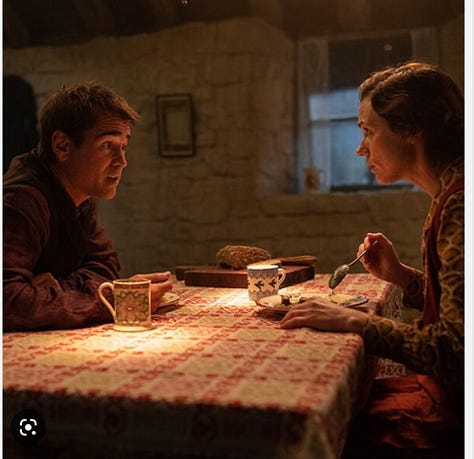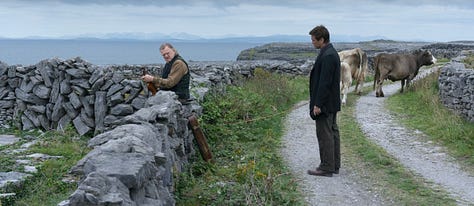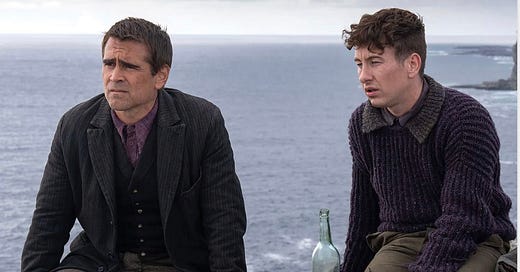A Vote for “The Banshees of Inisherin”
“Everything, Everywhere All At Once” probably has the Oscar for Best Picture sewed up, but “Banshees” has my vote and here’s why.



The Banshees of Inisherin is a beautiful short story of a movie about the oppressiveness, fragility, and indispensable nature of relationships. It’s both very funny and unbearably sad. Like McDonagh’s wonderful In Bruges, it gets its humor from the personalities of the characters as they interact with each other. Sometimes they are dense and mean-spirited and stuck in their ways, like the town’s busy body shop-keeper who demands “news” from her customers. Sometimes they are unexpectedly sharp: “What is he, 12?”says Dominic, the village “gom,” (Barry Keoghan) referring to Colm’s (Brendan Gleeson) “not liking” Pádraic (Colin Farrell) anymore; it’s possibly the best assessment given of Colm’s behavior in the movie. And sometimes the humor comes from the matter-of-fact way the characters behave outrageously. In one scene, Colm—a fiddle-player with artistic aspirations who suddenly wants to be left alone by the friend he had pints and “chatted” with all his life--has just confessed to the village priest that he has had “impure thoughts.” The priest, having been told by Padraic about their breakup, asks Colm if “it’s about him you have the impure thoughts about, is it?:
COLM: Are you joking me?! I mean, are you fecking joking me?!
PRIEST: People do have impure thoughts about men too.
COLM: Do you have impure thoughts about men?
PRIEST: I do not have impure thoughts about men! And how dare you say that about a man of the cloth...!
COLM: Well you started it.
PRIEST: Well you can get out of me confessional right now, so you can, and I’m not forgiving ya any of these things until the next time, so I’m not!
COLM: I’d better not be dying in the meantime then, eh Father, I’ll be pure fucked.
PRIEST: You will be pure fucked! Yes you will be pure fucked!
It’s difficult to convey on paper how hilarious this scene is, with the shouting between the two audible to everyone else in the church, as they get into it in as adolescent a manner as two drunk guys at the local bar. This is a father confessor?? This is the sanctity of the confessional?
But then there's the not-funny-at-all damage people do to each other. Whether they intend it or not, the people on the island always have their personalities, and often their hearts, on display—for better or worse. Often, it’s for worse. Not taking each other seriously enough, people say things without thinking—as we all do—and destructive things come out of it. Dominic tells Padraic that Colm liked it when he blew up at him at the tavern, and this gives Padraic the idea that Colm just needs some “tough love.” Not a good idea. Dominic, who has a crush on Padraic’s sister Siobhan (the incandescent Kerry Condon) decides to take a chance and ask her if there’s any hope for him. Not a good idea. She responds as gently as she can, but Dominic is crushed: “Well, there goes that dream.” This kind of thing happens over and over in the film. People don’t take the temperature of relationships and disaster follows: Fingers get chopped off. Lovely little donkey dies. A long-standing friendship is broken. There's a suicide.
[Below: Kerry Condon and Barry Keoghan in a heartbreaking scene from “The Banshees of Inisherin” ]
It's tempting to see the break-down of the longstanding brotherhood between Pádraic and Colm as a metaphor for the Irish-against-Irish war taking place in the background. (We're reminded of it through conversations about it and the sound of gunfire coming from the mainland) "It was so much better when it was us against the English,” Dominic’s thuggish policeman father says--and I'm sure the resonance of brother-against-brother was intended by McDonagh. But McDonagh himself has said that metaphors weren’t what he was after (nor was caricaturing the Irish, which some Irish critics have complained of. )“The starting point,” McDonagh has said, “was to capture the sadness of a breakup, be it a love breakup or a friendship one.” And that meant being “with the characters,” not using them to convey a message.
In his intimacy with his characters, McDonagh reminds me a bit of Robert Altman, whom Pauline Kael once described as “creating an atmosphere of living interrelationships and doing it so obliquely that the viewer can’t quite believe it…He has abandoned the theatrical convention that movies have generally clung to of introducing characters and putting tags on them.” Another way of saying this: Movies tend to be hyper-economical in communicating what characters are feeling or thinking, and resort to visual codes (for desire, love, confusion, etc.) and recognizable tropes to "inform" us of what the writers and directors want us to think about the characters and events. But McDonagh, besides writing characters who don't fit comfortably into any niche, gives us time--and lots of conversations, and unexpected turns--to get to know them. Poor Pádraic spends a third of the movie wrestling with the possibility that people find him "dull" (it took a lot of directorial confidence to have that conversation repeated over and over in various forms!) But we get to know a lot about him from his hapless obsessing about something that's never occurred to the "happy lad" (as he calls himself) and that cuts him to the quick. But Pádraic, as "nice" as he is, is no angel--and he lacks insight (to put it mildly) about himself and those around him. He plays a cruel trick on one of Colm's new musician friends to get him off the island. He’s then foolish enough to tell Colm about it, just as they might (possibly) be on the verge of mending things between them a bit. The remark sets into motion a series of horrible, shocking events that can't be undone.
I know a lot of viewers found those events to be gratuitously horrible. I didn't. True, they are horrible. And true, they function as a kind of literary device rather than a believable turn of events. But they are, regrettably and painfully, what's needed to shake Pádraic out of his persistent denial, his refusal to believe that Colm means business. Perhaps that's really what Colm wants above everything else, even his music: to be taken seriously as an artist, on an island of "fecking boring men” (as Siobhan, the voice of reason in the film, calls them—though she includes Colm in the lot)
“What do you need from him, Colm? To end all this?” she asks.
COLM: Silence, Siobhan. Just silence.
SIOBHAN: One more silent man on Inisherin, good-oh! Silence it is, so.
[She gets up to go...]
COLM: This isn’t about Inisherin. This is about one boring man leaving another man alone, that’s all.
SIOBHAN: ‘One boring man”! Ye’re all fecking boring! With your piddling grievances over nothing! Ye’re all fecking boring!
I'm not sure what Colm is after, to be honest. But it's really the "evolution" (for want of a better word) of Padraic's response that's the heart of the film. He just can't absorb the possibility that Colm really wants to break up with him, and everything he does--until the beyond awful happens--persists in denying it. Even after Colm throws a finger against his front door, he tries to minimize the finality of the message Colm is sending. He is about to bring the finger over to Colm's house, and Siobhan, rightly, is appalled:
Siobhan: You’ve got to leave him alone now, Padraic! For good!
PADRAIC: Do you think?
SIOBHAN: Do I think?! Yes, I do think! He’s cut his fecking finger off and thrown it at ya!
PADRAIC: Come on, it wasn’t at me.
The man has just shown you he'd rather lose a finger than continue a relationship with you and you're going over to his house? It takes a confrontation with true finality—the death of his beloved donkey, someone he cares deeply about, perhaps more than he cares about Colm--to convince him. And it changes him; he's no longer the "happy lad" he once was. Grim and more sober than we’ve ever seen him, he tells Colm: “Some things, there’s no moving on from.” He’s referring to the war on the mainland, but the words signal that he’s had it, finally. He won’t try anymore; “and I think,” he says, “that’s a good thing.”
For all the local particulars (which some Irish critics have objected to, seeing it as caricatured and demeaning of Ireland) this is a movie that resonates with universal human failings and fragility—and tender impulses, as well. Colm loves his dog and Padraic adores all his animals, particularly Jenny (who one reviewer perfectly described as "the most content and saddest creature on the island"), whose presence comforts him when he’s sad. Siobhan is tender and protective with Padraic, and he is loving with her, hiding the news of Jenny’s death in a letter to her after she’s left the island: “Even now, as I write, little donkey Jenny is looking at me, saying please don’t go, Padraic, we’d miss ya, and nuzzling me, the gilly gooly. Get off, Jenny!” It’s heartbreaking, that letter
And it comes from McDonagh’s heart, too. I was touched to read, in McDonagh's screenplay, "directions" for the animals: “The donkey looks in thru the open door, confused at all the sadness, then toddles away again,” "The pony looks concerned," etc. As someone who was very disturbed by Jenny's death (I didn't care nearly as much about those bloody stumps of fingers), those directions were confirmation that this was a writer with sensibilities that I share. And perhaps, in the end, that's why I loved this movie. (No lectures from vegans, please!)
Pauline Kael, in her review of McCabe and Mrs. Miller, wondered whether an American audience would accept “a movie as personal as this—not as in ‘personal statement’ but in the sense of giving form to his own feelings, some not quite defined, just barely suggested…movies that don’t resolve all the feelings they touch, that don’t aim at leaving us satisfied, the way that a three-ring circus satisfies?” One of the best of such movies—Aftersun—a debut film by writer director Charlotte Wells, wasn’t even nominated (the lead actor, Paul Mescal, was.) As for the Oscars and Banshees, we’ll see.




